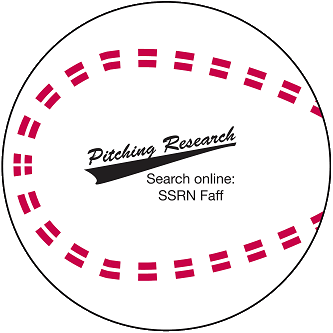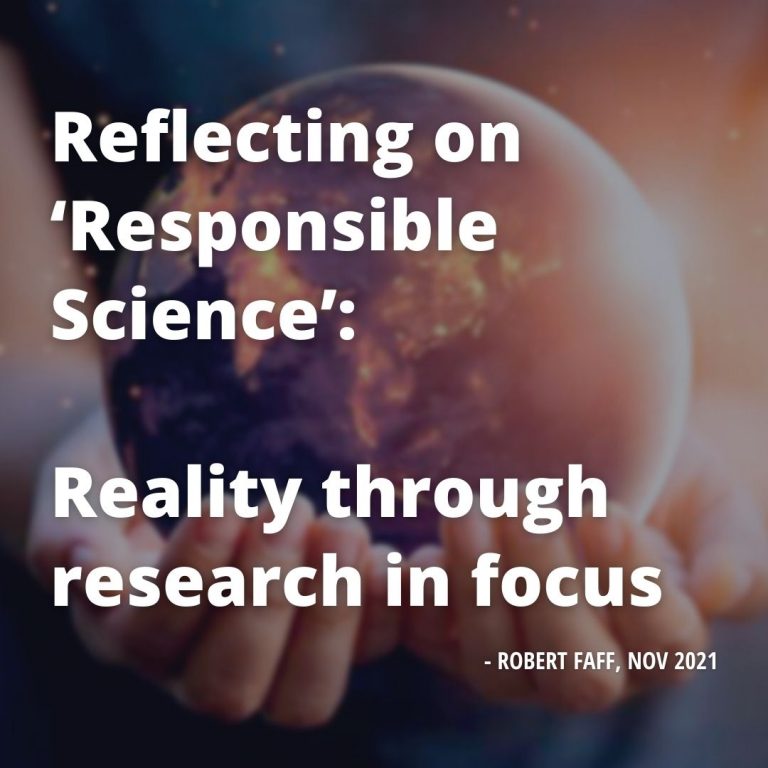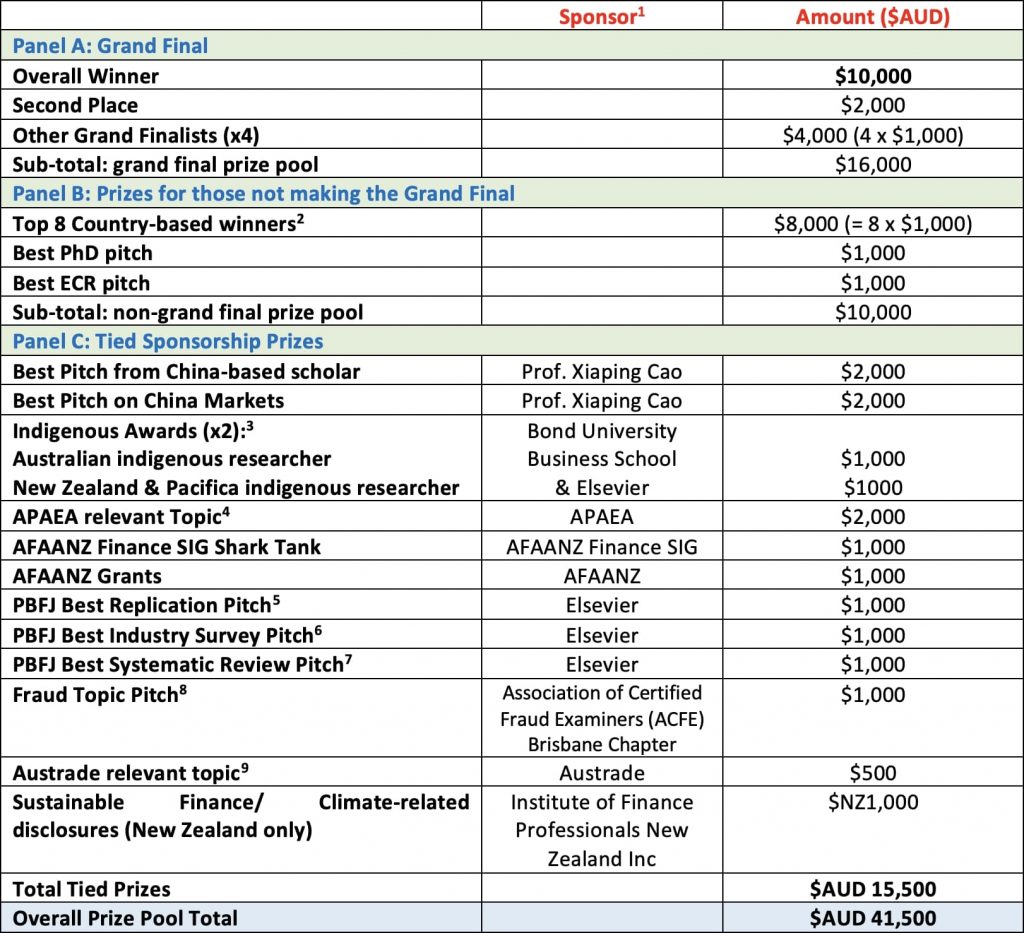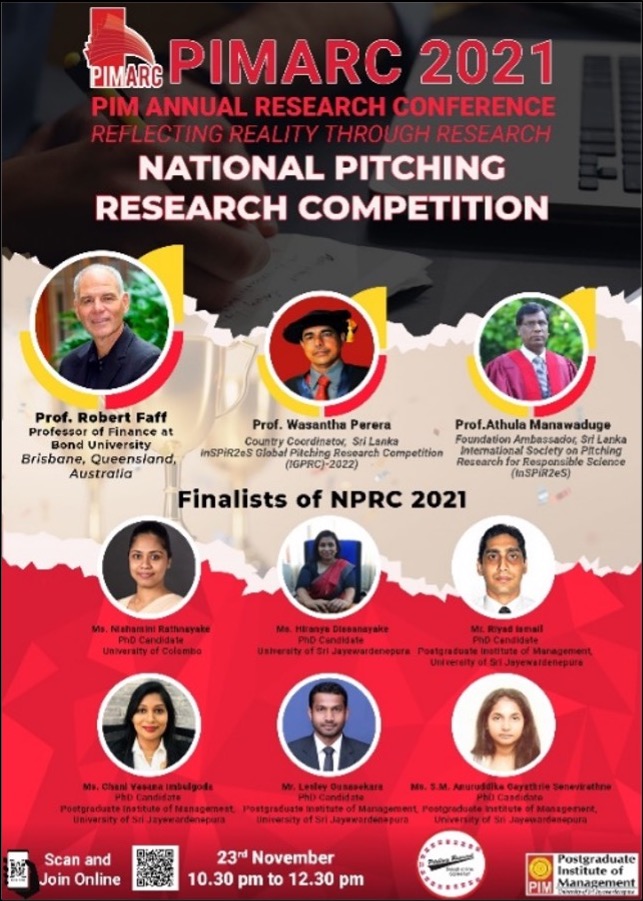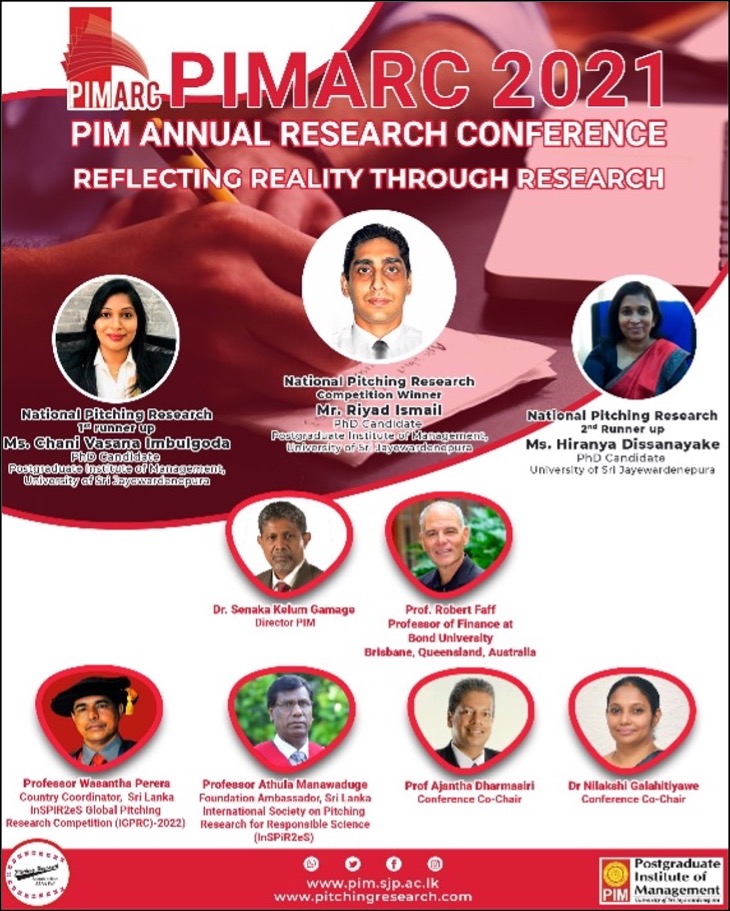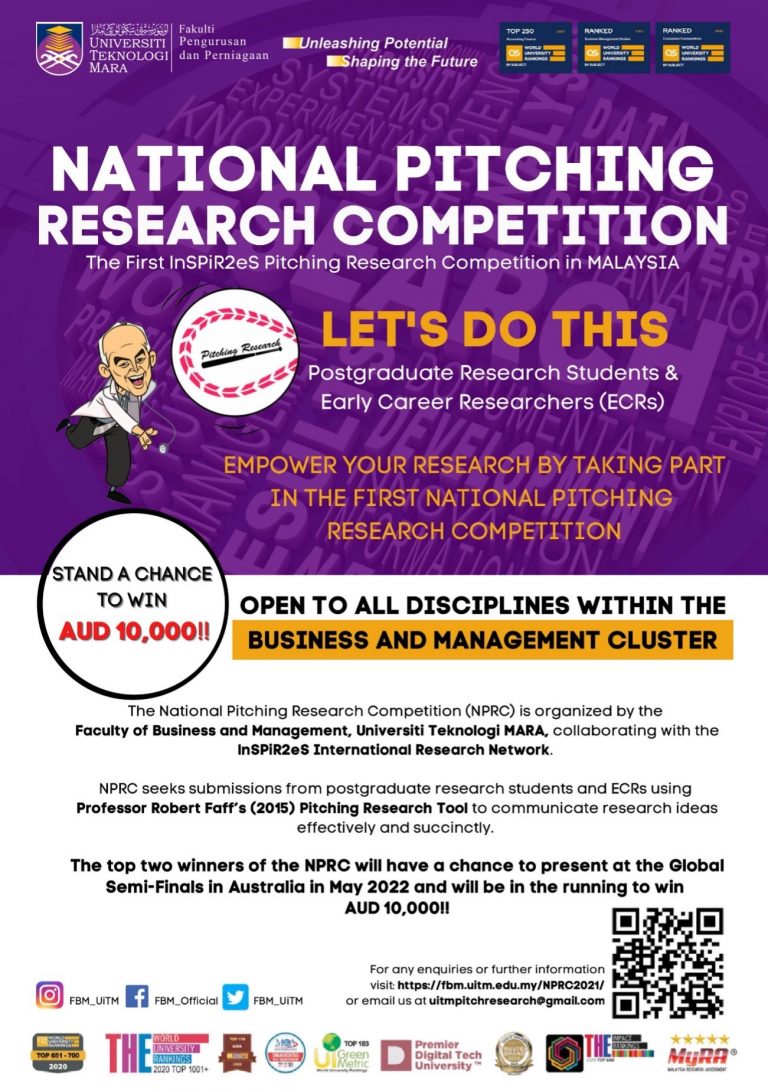Founder's Message
Welcome to our newsletter #3! There are 2 main themes: (a) progress on the InSPiR2eS Global Pitching Research Competition (IGPRC) and (b) reflections from those who have engaged with the pitching research framework. As you will recall, we launched IGPRC in our September Newsletter (#2) and now we are at the stage that a few arms of the competition have already concluded. In particular, I am very pleased to congratulate the following winners of sub-elements of the IGPRC:
Riyad Ismail (PIM, University of Jayewardenepura): “Investigating Final Year Undergraduates’ Career Self-Management Process During Education-to-Work Transition”.
Peter Truc Do (University of Queensland): “Do firms overpromise on their CSR commitments in IPO?”
Sorin Daniliuc (Australian National University): “A new approach to study the determinants of overpayment in M&A deals”
Lai Hoang & Md Zakir Hossain (University of Western Australia): “Insider Investment Horizon: Evidence from Australia” [replication pitch].
These winners will now proceed to the semi-final stage of the IGPRC.
Finally, I am pleased to share with you a link to an online article titled “Reflecting on ‘responsible science’: Reality through research in focus”, written on the basis of a keynote talk that I gave to the PIMARC2021 conference, which highlights the core theme of our network on responsible science.
Expand your Pitching Research skills and elevate your research, in the free Pitching Research MicroCredential Course, thanks to Bond University!
Global Pitching Research Competition
As announced in our September newsletter, InSPiR2eS is hosting a global research competition (IGPRC) that invites novice researchers to submit a 1,000 word “research pitch” by 28th February 2022. The pitch entry, conforming to Faff’s (2021) “Pitching Research” framework, must be created by a higher degree research student (HDR) or an early career researcher (ECR), explicitly mentored by either a thesis supervisor or senior researcher. The IGPRC online Grand Final is planned for May 2022. The basic structure of the IGPRC is depicted below.
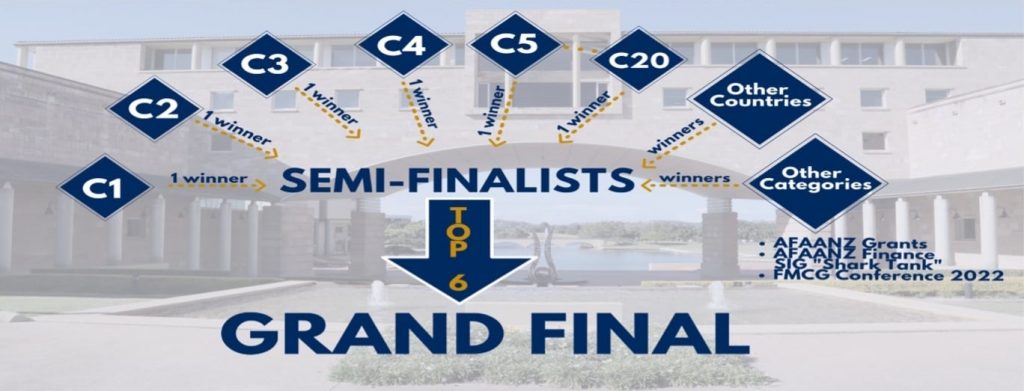
Cash Awards
There is a total prize pool of AUD$40,000, and the overall winner of the competition will receive AUD$10,000. A full listing of IGPRC cash prizes is displayed below:
[1] The untied prize pool is collectively sponsored by: Bond University; Elsevier; Bond Business School; University of Strathclyde Business School and an anonymous donor.
[2] To be eligible for a “Top 8” cash prize, that country must attract a minimum of 20 competition entries.
[3] There will be an award to two indigenous researchers, noting that the topic is not confined to cover an indigenous-specific research issue.
[4] Refer to: https://www.apaea.com/about-us. Contact Professor Paresh Narayan for further details on relevant pitch topics and conditions of the APAEA award: paresh.narayan2014@gmail.com or pareshkumar.narayan@monash.edu.
[5] The awardee agrees to target a PBFJ submission – see PBFJ replication guidelines: https://bit.ly/39OKNMz.
[6] The awardee agrees to target a PBFJ submission.
[7] The awardee agrees to target a PBFJ submission.
[8] Topic: must be related to fraud and should also have some type of educational “twist” (as that is the mission of ACFE). Presentation: in due course, the awardee commits to present at least one (virtual) seminar about the findings from their research, at one of the regular ACFE Brisbane chapter events.
[9] See https://www.austrade.gov.au/.
Journal pre-IPA Sponsorships
Aside from the cash awards outlined above, several journal editors are offering the opportunity to target a pitch toward their journal. If deemed to be of sufficient relevance and high quality, a journal editor might agree to “sponsor” the project, via a “pre-IPA”, to possible publication in that journal. A “pre-IPA” amounts to an editor provisionally giving an “in-principle accept” (IPA) decision solely based on the submitted pitch. To convert this “pre-IPA” into an unconditional “IPA”, each editor will determine what additional process is required for their journal. Such process will likely involve the creation of some form of a (reviewed) detailed pre-registered “protocol” plan specifying how the empirical study will be executed (before any data analysis has taken place). Down the track, under normal circumstance the IPA will convert into an unconditional acceptance, after an appropriate form of review of the fully executed study. Final acceptance is not guaranteed however e.g., if it is deemed that the researchers materially depart from their protocol plan, without adequate justification or honest portrayal.
The journals involved are:
Key Reference & Helpful Links
Calling for Volunteers!
Please do your bit & join the ad hoc pool of IGPRC Assessors!
The IGPRC will enter the assessment phase in March/April 2022 and we are looking for volunteers to assess entries. This is a critical part of the IGPRC and many hands make light work! Together, lets show the power of the InSPiR2eS network …
There will be training sessions offered in February next year. For now, all that you need to know is that a simple but effective assessment process will be used, based on 5 criteria:
- Clarity
- Meaningfulness
- Effort based
- Connected
- Conversation starter
Assessors will score each criteria out of 10, which will be aggregated to give a total score out of 50. Please note that Independence is important – assessors will not be asked to assess any entries from their own country. Also, as an expert in the field, we anticipate that each assessment task will require only about 30 minutes of your time.
This is a fantastic opportunity to engage with the network and meaningfully contribute to the network mission! So, please register NOW your willingness to be an IGPRC assessor below:
THANK YOU!
Pitching Research Spotlight
2021 National Pitching Research Competition (NPRC), Sri Lanka
We congratulate Postgraduate Institute of Management (PIM), University of Sri Jayewardenepura, Sri Lanka on successfully conducting the 2021 National Pitching Research Competition (NPRC) as an integral part of the Postgraduate Institute of Management Annual Research Conference (PIMARC -2021) on 23rd of November 2021. This was the first ever competition organised by PIM in collaboration with the InSPiR2eS Global Pitching Research Competition (IGPRC). Prof. Robert Faff graced this inaugural occasion as the keynote speaker of the PIMARC and Chair of the international panel of judges. We are grateful to Professor Wasantha Perera, the Country Coordinator of the InSPiR2eS Global Pitching Research Competition (IGPRC), and Professor Athula Manawaduge, the foundation ambassador in Sri Lanka of the InSPiR2eS global research network, for liaising with PIM to organize this event in accordance with the guidelines of InSPiR2eS Global Pitching Research Competition (IGPRC). We also thank Dr. Nilakshi Galahitiyawa, as the Co-chair of the conference, for coordinating this event with IGPRC country coordinators. We also appreciate the participation from Dr. Kalum Gamage, the current Director of PIM, and Prof. Ajantha Dharmasiri, the Co-chair of the PIMAR-2021, in this special event.
What was the aim of the competition?
The main aim of organizing the NPRC was to assist Higher Degree Research (HDR) students in Sri Lankan national universities to produce a well-rounded, effective and achievable research project by providing a simple mechanism for communicating a new research idea and starting a conversation with a potential research mentor. Further, it created a solid national and international research platform for HDR students in Sri Lanka.
How the competition was conducted and winners were selected?
At the initial stage, three workshops including the information session were conducted to the potential HDR students to build the awareness on Pitching Research Framework (PRF) and competition. The information session for the NPRC 2021 was held on 2nd October 2021 and more than 50 HDR students from different Sri Lankan national universities successfully registered for this event. The inventor of the PRF, Professor Robert Faff, the Country Coordinator of the InSPiR2eS Global Pitching Research Competition (IGPRC), Professor Wasantha Perera, the foundation ambassador of the InSPiR2eS global research network, Professor Athula Manawadugae and the Vice-president of the IGPRC, Dr. Ihtisham Malik all participated in the information session as the resources team. The deadline for submissions to the NPRC 2021 was 1st November 2021. Finally, 6 pitches were selected for the grand final based on the quality of their written pitches by an eminent panel of foreign and local reviewers considering the five golden evaluation rules. The selected finalists were Ms. Hiranya Dissanayake from University of Sri Jayewardenepura, Ms Chani Imbulgoda from Postgraduate Institute of Management, Ms. Anuruddhika Senevirathne from Postgraduate Institute of Management, Mr. Lesley Gunesekara from Postgraduate Institute of Management, Ms. Nishamani Rathnayake from University of Colombo and Mr. Riyad Ismail from Postgraduate Institute of Management.
The winners of the Sri Lankan NPRC grand final were determined on the combined quality of both written and oral pitches by a panel of international judges. Each of the 6 selected finalist was given 10 minutes for the presentation. The panel was led by Prof. Robert Faff, Bond University and other members of the panel were Dr. Ihtisham Malik, University of Queensland and Prof. Adrian Gepp, Bond University. The winner of NPRC -2021: Mr. Riyad Ismail from PIM; 1st runner-up: Ms. Chani Imbulgoda from PIM and 2nd Runner-up: Ms Hiranya Dissanayake from USJP. The PIMARC committee also offered another award upon the virtual audience selection and Ms. Hiranya Dissanayake voted as the best Pitching Research Framework (People’s Choice Award). The all winners of the NPRC were awarded cash prizes and certificates at the warding ceremony of the grand finale.
The National Pitching Research Competition came to an end with a great success and the winner of this competition, Mr. Riyad Ismail from PIM, will progress to the semi-final round of the IGPRC
2021 National Pitching Research Competition (NPRC), Malaysia
click to enlarge
Key updates from VPs

InSPiR2eS network resources “inspires” current and ongoing research
Dr. David Mathuva (VP – Africa) from Strathmore University Business School, Nairobi, Kenya is grateful to the InSPiR2eS network for pitching research resources available through its digital platform, which has enabled him and his colleagues to successfully publish following three research articles in reputable journals, within a reasonable turnaround time in 2021.
Click the titles below to access the papers:
- Does banking regulatory regime affect the quality of bank earnings in the East African region?
- Revisiting earnings quality and bank efficiency among East African developing economies: do systemic banking and financial crises matter?
- Agency and institutional-related factors and the heterogeneity of sustainability and integrated report information disclosures in Kenya
Reflection: The pitching research framework (PRF) has now become an integral part of Dr Mathuva’s current and future research. From his experience, the PRF helps researchers to “configure” and develop a clear focus for research project from the very onset including the target journal to “pitch” the paper, “fall back” plans for the research project as it develops over time, and most importantly the contribution the projects aims to make. Overall, Dr. Mathuva believes that PRF helps researchers to gain focus from the word go, and minimises the “meandering” that often arises in a typical research project by nearly 40%. Contact Dr Mathuva via email dmathuva@strathmore.edu to get more insights about the application of pitching research for quality publications.

Pitching Research Framework helps teaching research at graduate level
Dr Maria Mumbi Wachira – a colleague of Dr Mathuva at Strathmore University Business School has extensively adopted Pitching Research Framework to teach research at graduate level since 2019. Dr Wachira’s experience shows how rich and deep one can go to gain great value from the framework. The specific details of Dr Wachira’s initiatives and reflections are provided below:
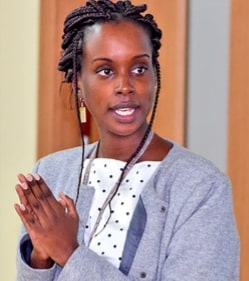
(average attendance of 60 students per clinic) to help them in smooth transitioning from coursework to research. In these clinics, the pitching template is introduced with examples but students are not required to complete their own template.
(average attendance of 28 students per seminar) on how to use the template for their research. In the first session, template is introduced with several examples. In the follow up session, students complete their own templates and deliver a presentation to the wider audience
within the Master of Commerce Program (Average enrolment is 12 students). As part of the assessment, students are required to complete the template at the start, in the middle and towards the end of the semester.

Reflection: Dr Wachira found Pitching Research an incredibly useful framework for teaching students on how to develop their graduate research topics. Dr Wachira finds that the framework helps bridge a gap between what students learnt in research methods and how the concepts learnt are applied in their graduate research. The framework is also useful in driving the point home on the importance of expressing “what’s new” and the infamous (and yet crucial) “so what” of one’s study. In a snapshot, Dr Wachira is able to get to the core of what the students aim to do and can efficiently support them in refining their ideas. Finally, Dr Wachira also believes that the framework should be used continuously throughout the research process to improve the research project over time. Dr. Wachira recommends other educators to adopt the framework, regardless of their discipline or area of research. Interested to get more insights, contact Dr Wachira via email mwachira@strathmore.edu.
If anyone has such experience to share, please contact Professor Agyenim Boateng (VP-Course Materials) and Marinela Finta (assisting) at agyenim.boateng@dmu.ac.uk, as they are maintaining a record of pitching research course activity.
Pitching Research Framework Facilitates Mentoring Novice Researchers
In his role of VP – Research Mentor, Dr Rand Low has been using the pitching research framework to guide several PhD candidates into their research proposals and applications for MPhil/PhD programs at the University of Queensland and Bond University
- Candice Cao (Bond)
- Ricky Soh (Bond)
- Michael Senescall (Bond)
- Adam Stennett (Bond)
- Laurie Bowman (UQ)
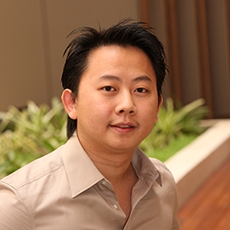

Dr Low has also been working with Early Career Researchers at the University Technology Mara, Malaysia on their research paper. He used the pitching research framework as intended for them to succinctly and concisely describe their research to him so he could help them develop it further.
- Dr. Norliza Che
- Ms Sarah Gan
We wish Dr Low a very best of luck in his mentoring role and look forward to celebrating the success stories of nurturing novice researcher through the pitching research framework. Contact Dr Low at rlow@bond.edu.au if you are interested to participate in the pitching research mentoring program.
Updates from a Sister Network
A New Journal is in Town!
The Journal of Comments and Replications in Economics (JCRE) aims to be the premier outlet for articles that comment on or replicate previously published articles in economics and closely-related disciplines. Editorial decisions are based on the quality of the replication, without regard to whether the results confirm or refute the original study. JCRE is an open-access e-journal and articles are published continuously. JCRE charges no fees from authors at any point in the submission or publication process.
